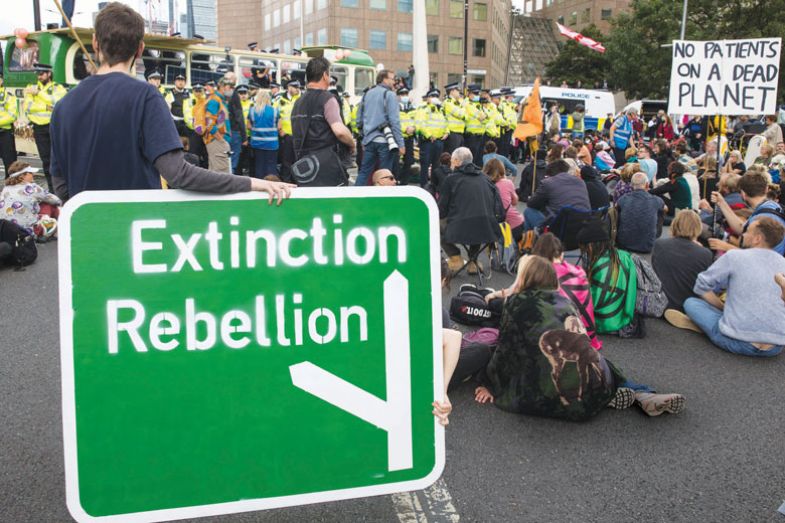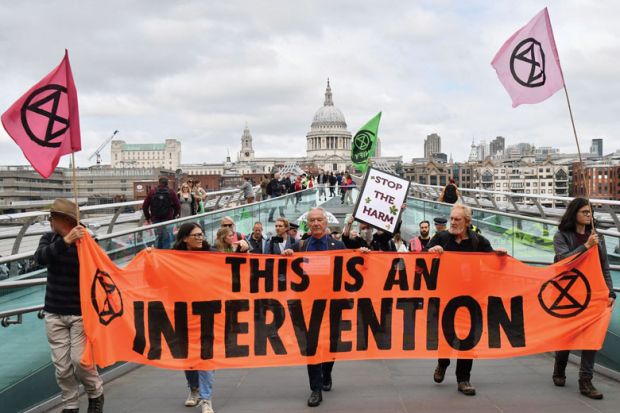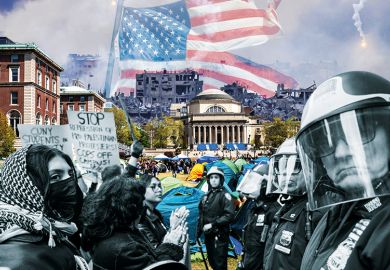By the time you read this article, I may be held on remand at Pentonville or Belmarsh prison in London. If I’m still at liberty, I hope it won’t be because I have bottled out of a climate emergency protest to which I have, at the time of writing, committed myself, but rather that the criminal justice system has recognised the rightness (or at least the legitimacy) of our action.
I can trace my involvement in the climate movement Extinction Rebellion (XR) back to 26 October 2018, when 96 academics, including one vice-chancellor and Rowan Williams, the former Archbishop of Canterbury, wrote a letter to The Guardian endorsing XR’s plans to launch a campaign of non-violent civil disobedience: “The ‘social contract’ has been broken, and it is therefore not only our right, but our moral duty to bypass the government’s inaction and flagrant dereliction of duty, and to rebel to defend life itself.” At its launch five days later, XR presented three demands: to tell the truth; to decarbonise by 2025; and, in order to ensure a just transition to a zero-carbon economy, for decision-making about how to achieve this to be handed over to a citizens’ assembly. The letter and XR declaration together struck a chord in me as someone who had been increasingly concerned by the scientific evidence of climate change, the failure of the political classes to acknowledge the situation, let alone take adequate action, by the election in the US of an outright denialist as president in 2016, followed by the withdrawal of the US from the 2015 Paris agreement on climate mitigation. A few weeks later, on a dark November morning, I undertook my first act of rebellion.
THE Campus resource: how to use participatory group activities to engage students in sustainability
I arrived at an agreed meeting place near Victoria station to participate in a week of road blockades. Stepping into the road at a major junction by Victoria station was a Rubicon moment, a “trampoline leap into the infinite” (to use Søren Kierkegaard’s vivid metaphor), arousing an intense bond of what I can only call love for my 12 fellow rebels, strangers all, and a powerful sense that we were part of something so much bigger.
Before I describe how I got further involved, I want to take a step back. I am an opera scholar, whose environmental interests had, until recently, never gone much beyond membership of Friends of the Earth and Greenpeace, and who was looking forward to easing myself into a cushioned retirement of reading, writing, performance-going and travel. So why have I found myself instead undertaking acts of non-violent lawbreaking? When I first proposed this piece to Times Higher Education, one of the editors asked me: “Do you see any connections between the concerns of your day job and your activism? People draw on all sorts of religious and intellectual traditions in thinking about the environment and our responsibilities to the planet, but I don't imagine there are any obvious links with Mozart!” So, I ask myself, where are the links between my inteIlectual interests (and life as an academic) and my decision to embrace civil disobedience and possible imprisonment?

I have been a political activist since my early twenties, at the start of the 1980s. I have to confess that, like many on the Left at the time, I was somewhat dismissive of Green politics, considering environmental campaigners to be more concerned about birds and bees than the class struggle. But historians and theorists of Marxism, such as John Bellamy Foster and Jason W. Moore, have uncovered a strongly ecological agenda in Marx’s own work, and over the years I have come to recognise that the class struggle cannot be dissociated from our relation to the environment. I now see the cause of environmental repair and sustainability as also the cause of justice for all life on earth.
I don’t need to elaborate the fundamental case about climate change again here. We are already seeing the devastating effects (wildfires, floods) of a temperature rise of only 1.2 degrees Celsius. If we continue to ignore the emergency and temperatures rise a predicted 5.7 degrees by the end of the century, we are likely to witness what Sir David Attenborough has called “the collapse of our civilisations” and the extinction of most life on the planet.
Scientists, including many colleagues at the University of Sussex, have obviously been central to making this case. Benjamin Sovacool, professor of energy policy, was the lead author for one chapter of the recent landmark report by the Intergovernmental Panel on Climate Change. Other colleagues are activists. Political ecologist Andrea Brock, lecturer in international relations, studies the relationship between extractivism, corporate power, state violence and the criminalising of dissent, but also advises groups such as anti-fracking protesters. The Centre for World Environmental History, founded by the historical anthropologist Richard Grove, has an “Academia and Activism” programme that involves, for instance, working with tribal groups in India who are trying to prevent deforestation.
And what of the humanities? It might be assumed that my own discipline, musicology, has little direct relevance to the environmental cause. Yet my music department colleague Alice Eldridge, director of the Sussex Humanities Lab, works with biologists and zoologists to deploy the methods of soundscape field recording (often used as an aesthetic practice) to map the biodiversity of tropical forests whose density means that researchers are otherwise unable to identify fauna through more conventional visual means.
We have also seen the development over the past four decades of an intellectual movement in the humanities broadly called ecocriticism. Historians, philosophers, cultural and literary theorists have all turned their attention to the way in which cultural forms relate to, and shape attitudes to, the natural world. They invariably challenge the anthropocentric perspective of Western cultures, and offer alternative conceptual, ethical and imaginative frameworks for how we might relate less damagingly to the material world in which we are embedded.
Even where it was not avowedly environmental, I can recognise an ecocritical thread in my own work. In my 1992 book, Mozart and the Enlightenment: Truth, Virtue and Beauty in Mozart’s Operas, I pointed to a recurrent pastoral strain in the operas that draws upon the Rousseauist critique of modern civilisation and its suppression of nature. I have also used the work of my late colleague Richard Grove, whose monumental 1995 book, Green Imperialism: Colonial Expansion, Tropical Island Edens and the Origins of Environmentalism, 1600-1860, was the first to show how European attitudes to nature were informed by colonialism. In my current research on the prevalence of the Orpheus myth in the earliest operas around 1600, I’m investigating how representations of Orpheus’ magical powers over nature – the trees, birds and animals (and, in some versions of the myth, uncivilised, acorn-eating humans) that are entranced and tamed by Orpheus’ music – re-enforced the colonial imaginary of the European encounter with peoples represented as “savages” so that they could be either “civilised” or enslaved.
We urgently need research into alternative social, political and economic models, such as those explored by Kate Raworth in Doughnut Economics: Seven Ways to Think Like a 21st-Century Economist, as well as new technologies. So I certainly see an essential role for academics in illuminating how we have got to where we are now and in imagining a better future. But the political classes, the media and, above all, the corporations that make their money from environmental destruction have learned to turn a deaf ear to academic research and, worse, to distort and greenwash.
“If you want change you have the ballot box,” say those who object to direct action (or “mob rule”, as they prefer to call it). Yet we have run out of time for the ballot box in our sham-democratic plutocracies. As Sir David King, former UK chief scientist, said earlier this year, “What we do over the next three to four years, I believe, is going to determine the future of humanity. We are in a very very desperate situation.” For many of us who have spent our lives going on protest marches, signing online petitions and writing letters to MPs, direct action seems the only option left.
I escaped arrest in November 2018. But there was no going back. The following January, I attended what was billed as the first national meeting of the rapidly growing XR movement, at which the co-founder and chief strategist, Roger Hallam, explained the history and theory of non-violent direct action – based on his PhD research into civil rights campaigns still under way at King’s College London. (I have ribbed Roger that XR is simply the action research part of his PhD, for which he has assembled 10,000 people to test his hypothesis.)
Speaking to about 60 people, Roger told us that, following his methodology, in three months’ time, XR would blockade central London, bringing the economy of the city to a standstill; that there would be mass arrests, more than ever before in British history; and that the government would eventually be forced to negotiate with us. “I can’t promise anything,” he said, “but we have no other option. You just have to take a chance that my research into how direct-action civil disobedience works is correct.” This was another Kierkegaardian moment, involving a leap whereby we – and the many more who were not in the room – had to make a commitment based on the faith that others would do so too; that enough of us would turn up, and be willing to risk arrest, for Roger’s scenario to unfold.
But that leap was not made in isolation. There was extensive planning and preparation, including a programme of workshops and training in the ethos and practice of non-violent direct action, knowing one’s legal rights, outreach to the (often hostile) public, de-escalation of aggression, arrestee support and so on. We formed ourselves into “affinity groups”, which served as the units for manoeuvres planned like a military operation, but also looked out for each other’s safety and welfare.
So, on a fine April morning, I made my way to the agreed meeting point in Hyde Park. Pumped with anxious adrenalin, I’d got there early. The park was deserted, and I found myself praying that enough people would materialise. And they did. Ten thousand of us. At 9am, we got the order to blockade some specified streets around the Marble Arch area. A tent city sprung up there, a pink boat sailed into Oxford Circus and Waterloo Bridge was transformed into an instant garden bridge.
Events unfolded over the next 10 days exactly as Roger Hallam had predicted. London was brought to a standstill; the police didn’t know how to respond; 1,300 people were arrested (including myself, slammed up against a wall as a phalanx of police in full riot gear forced a passage to remove the pink boat from Oxford Circus, and then dragged away handcuffed and kept in a police cell for 12 hours). Parliament declared a climate emergency (the first in the world to do so, on the initiative of Jeremy Corbyn); and the government was compelled to meet with our spokespersons. We had succeeded. It was the most exhilarating, badass, emotional and moving two weeks of my life. Travelling home on the Tube when the rebellion was over, an unknown young woman who had seen me being so violently arrested came across and gave me a huge hug. I wept the rest of the way home.
What happened next was a massive, and predictable, let-down. London Mayor Sadiq Khan celebrated a return to “business as usual”, government promises (and the parliamentary declaration) proved to be hollow. We met instead with lies, obfuscation and vilification, including an attempt to get us classified as “terrorists”. Somehow we had to consolidate and build further on what had been achieved.
Since April 2019, XR has grown into a global movement with 800 or so groups in 96 countries – the largest protest movement in history. There have been many criticisms: its predominantly white middle-class membership in the global north; its (sometimes necessarily) opaque command structure; its emphasis upon arrest as an objective; its stance “beyond politics”, which led it to decline support for Corbyn’s transformational green programme in the 2019 election; and above all its disruptive tactics, which, it is objected, alienate the very people whose support we need. XR has attempted to address these criticisms, for instance by working with community environmental groups, as well as with related political campaigns such as Black Lives Matter. But the evidence suggests that even when people don’t like our tactics or nose rings, XR has succeeded massively in bringing climate change to the forefront of people’s consciousness, and must continue to do so.
It is for such reasons that I have decided to go yet one step further and sign up for a campaign intended to escalate the pressure of last month’s “Impossible Rebellion” with a much smaller number of people. This carries the risk not only of arrest, but of imprisonment. But compared with people who are simply trying to get through from day to day, who don’t have the privilege of generously paid holidays, who may have children or elderly relatives to take care of, at this stage in my life I have nothing to lose and no excuse for inaction.
I have been mindful of the lines from T.S. Eliot’s play Murder in the Cathedral when Thomas à Becket, contemplating martyrdom, declares that “The last temptation is the greatest treason: To do the right deed for the wrong reason.” But I don’t believe I’m indulging in heroics, let alone martyrdom – there are many countries where environmental protesters, particularly native peoples, have been murdered; to pretend to heroism or martyrdom in a (albeit increasingly authoritarian) western European democracy would be an affront to their memory. As a middle-class white European who has been a member of the most privileged generation in history, but also the generation heedlessly responsible for the crisis we now find ourselves in, I simply feel that it is payback time for my privilege.
XR has a phenomenal organisational infrastructure, with input from professional environmental researchers and campaigners, journalists, lawyers, event organisers and so on. I don’t bring any specific academic skills to my engagement, beyond well-trained analytical thinking and a facility for public speaking as a lecturer, which I have drawn on for our recruitment meetings. But there is no doubt that my commitment is sustained by the intellectual certainty I have derived from the systematic research that has underpinned my more emotional response to the crisis. Engaging with my fellow historians, political and economic theorists, anthropologists and philosophers has informed both my understanding and behaviour in ways that confirm, for me, one of the core values of academic work and demonstrably challenge popular charges against academics of enjoying ivory-tower exclusion from the “real” world.
Nicholas Till is professor of opera and music theatre at the University of Sussex.
Register to continue
Why register?
- Registration is free and only takes a moment
- Once registered, you can read 3 articles a month
- Sign up for our newsletter
Subscribe
Or subscribe for unlimited access to:
- Unlimited access to news, views, insights & reviews
- Digital editions
- Digital access to THE’s university and college rankings analysis
Already registered or a current subscriber? Login










